Analyzing John F. Kennedy's Inaugural Address
John F. Kennedy’s inaugural address has gone down in history as one of the very best. On the late president's 102nd birthday, let's take a look at how his words moved a nation.
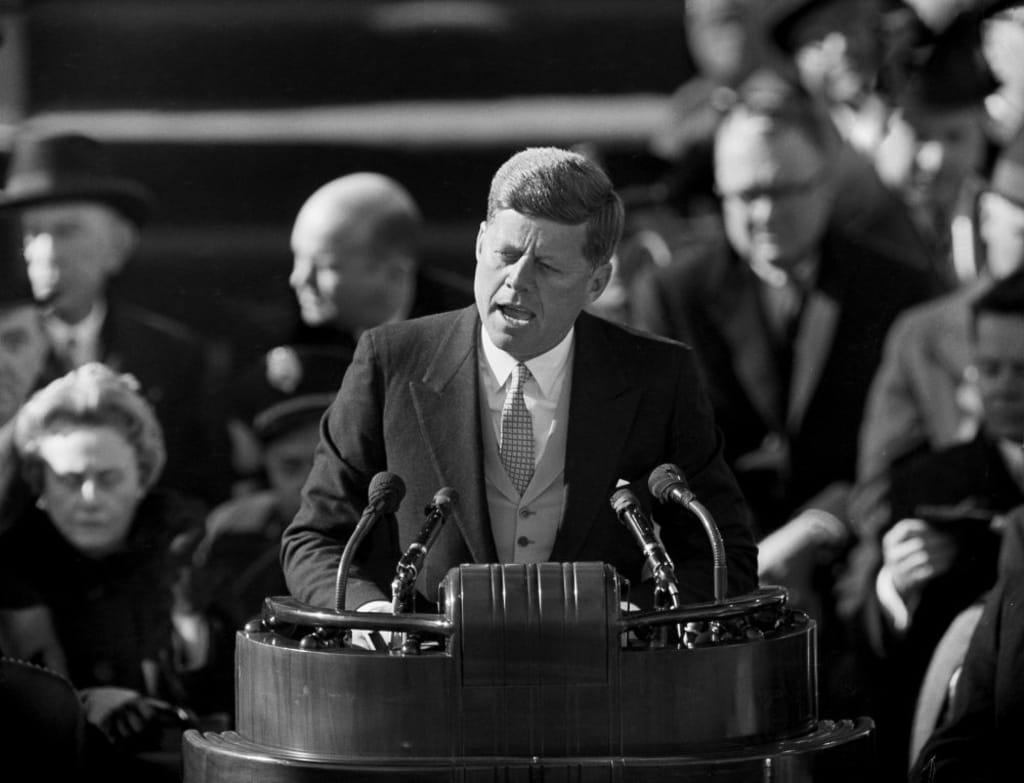
John F. Kennedy’s inaugural address was delivered on a freezing cold January morning in 1961. Despite his ailing back problems, he had never looked stronger than in that moment, delivering his speech to a welcomed crowd. All eager to tackle the “New Frontier.”
Standing at the podium in just his overcoat, he began his first official speech as President of the United States. Kennedy’s voice was powerful and meant every word he spoke. Overall, his inaugural address may not be his best speech but it did unite a country in a significantly short period of time compared to other presidents in the past.
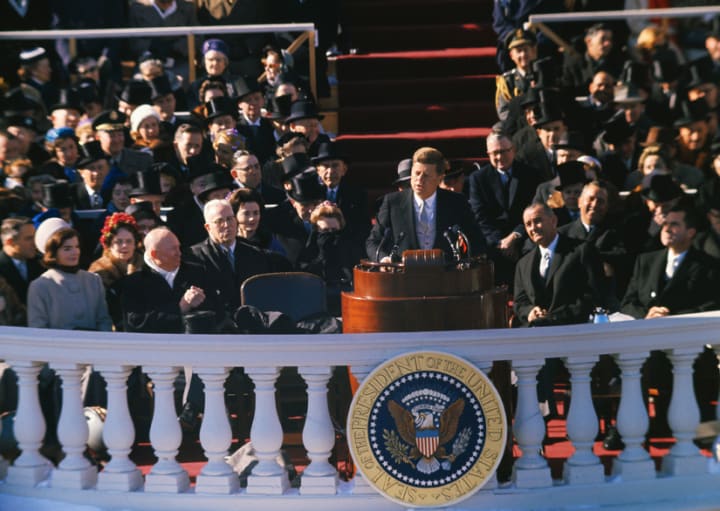
There are three main principles in any good inaugural address: unify the country, announce the administration’s foundations, and reinstate the government’s capabilities.
“We observe today not a victory of party but a celebration of freedom — symbolizing an end as well as a beginning — signifying renewal as well as change. For I have sworn before you and Almighty God the same solemn oath our forbears prescribed nearly a century and three-quarters ago.” In JFK’s opening remarks, he is already merging both sides of the country together, stating that each party was an important part of this decision. He lets them know that although only one party can come out on top, this choice is ultimately the correct one.
Kennedy goes on to unify not only the country but the United States’ allies as well.
"To those old allies whose cultural and spiritual origins we share, we pledge the loyalty of faithful friends. United there is little we cannot do in a host of cooperative ventures. Divided there is little we can do — for we dare not meet a powerful challenge at odds and split asunder.”
As not only Americans but mankind, we have the obligation to work together in order to make the world we live in a better place. Which leads into the second essential principle: announce the administration’s foundations.
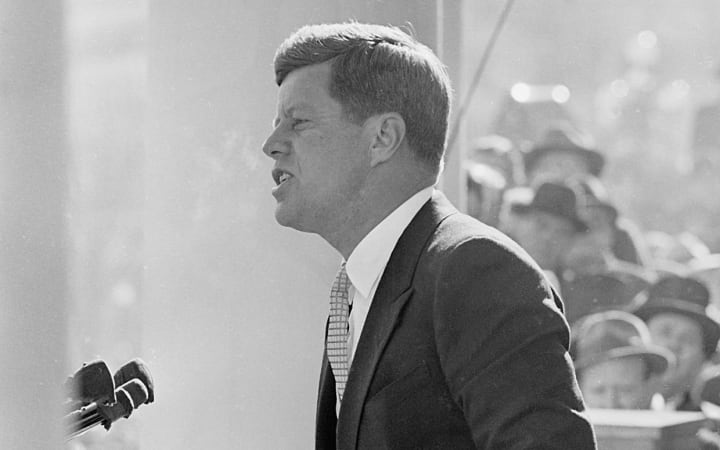
The inaugural address is not a time to campaign. The campaigning is over. What the speech is meant to do is highlight the significant policies that this government intends to strive towards. Kennedy made it known throughout his campaign that he wanted to achieve peace with the Soviet Union. Despite not mentioning the communist country, he requests that both sides come to a peace agreement during his time in office.
“Finally, to those nations who would make themselves our adversary, we offer not a pledge but a request: that both sides begin anew the quest for peace, before the dark powers of destruction unleashed by science engulf all humanity in planned or accidental self-destruction. We dare not tempt them with weakness. For only when our arms are sufficient beyond doubt can we be certain beyond doubt that they will never be employed.But neither can two great and powerful groups of nations take comfort from our present course — both sides overburdened by the cost of modern weapons, both rightly alarmed by the steady spread of the deadly atom, yet both racing to alter that uncertain balance of terror that stays the hand of mankind's final war.”
The fear of the end to mankind must bring both countries together in order to preserve the peace.
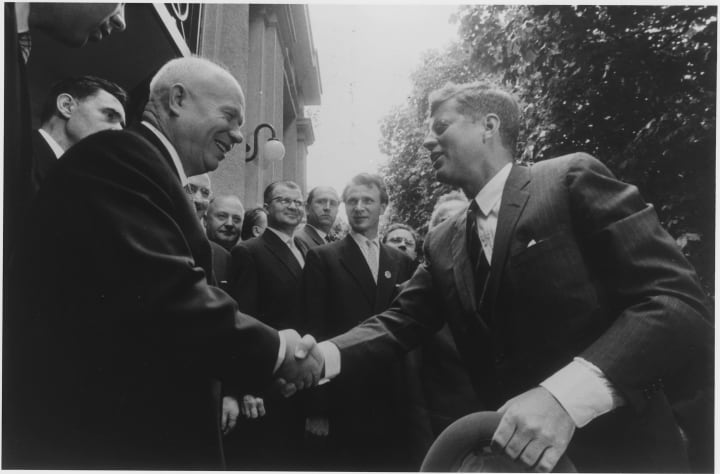
Nikita Khrushchev with President John F. Kennedy
Kennedy also mentions poverty and science as principles he intends to improve over his term.
Lastly, any president needs to reinstate the government’s capabilities. The message needs to incorporate “we,” “our,” and “us” instead of “I.” Kennedy mentions the word “we” (being the American people) 30 times throughout his speech. In comparison, he only says the word “I” four times. Three of those he uses when discussing his strength and every Americans strength in standing up for what they believe in.
“In the long history of the world, only a few generations have been granted the role of defending freedom in its hour of maximum danger. I do not shrink from this responsibility — I welcome it. I do not believe that any of us would exchange places with any other people or any other generation. The energy, the faith, the devotion which we bring to this endeavour will light our country and all who serve it — and the glow from that fire can truly light the world.”
Kennedy’s address is also filled with rhetorical devices like alliteration and repetition that continuously allow himself to get his point across in such a persuasive way. By using alliteration in the sentence, “Let every nation know, whether it wishes us well or ill, that we shall pay any price, bear any burden, meet any hardship, support any friend, oppose any foe to assure the survival and the success of liberty,” his thoughts flow easier.
When JFK repeats the word “let,” he wants to evoke emotion and put emphasis on the fact that we have an opportunity to grow if we can rise to the challenge.
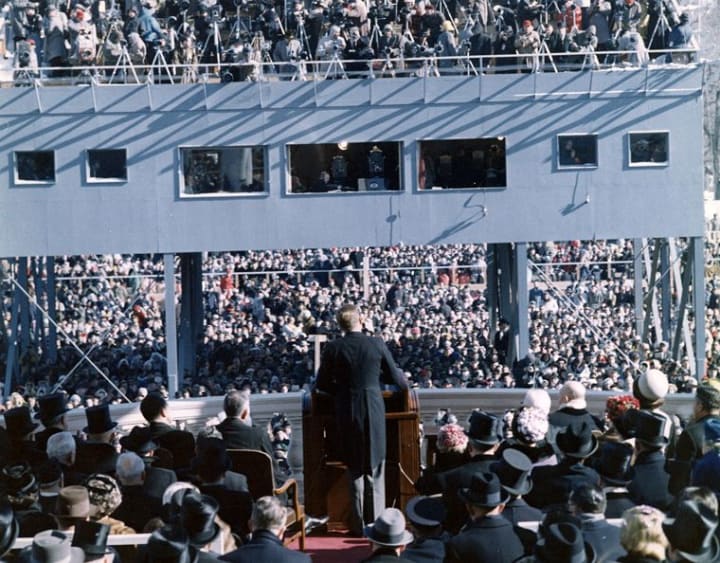
The most quotable moments come near the end of Kennedy’s speech.
“And so, my fellow Americans: ask not what your country can do for you — ask what you can do for your country. My fellow citizens of the world: ask not what America will do for you, but what together we can do for the freedom of man. Finally, whether you are citizens of America or citizens of the world, ask of us here the same high standards of strength and sacrifice which we ask of you. With a good conscience our only sure reward, with history the final judge of our deeds, let us go forth to lead the land we love, asking His blessing and His help, but knowing that here on earth God's work must truly be our own.”
Essentially, Kennedy is reiterating his entire speech in just a few short sentences. He focuses on uniting all sides together, puts emphasis on the American people, and allows the different levels of power to be determined by civilians.
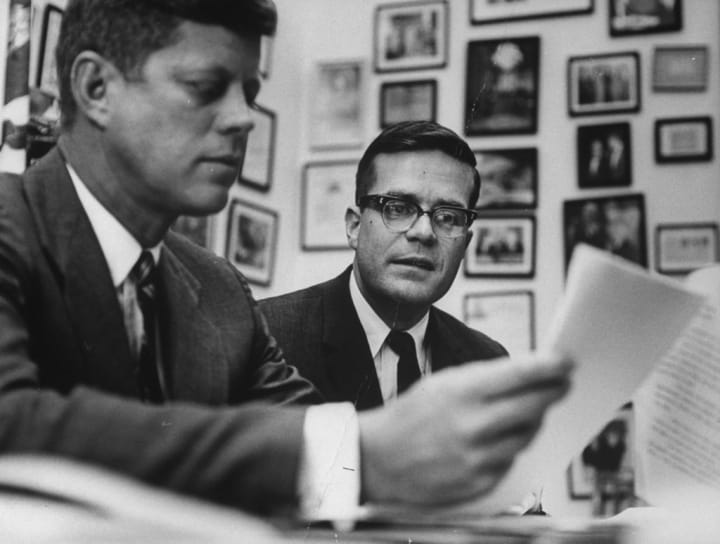
President Kennedy and Ted Sorensen
Ted Sorensen, Kennedy’s speechwriter, deemed this as well as many of the president’s other speeches as collaborations over an individual effort. Sorenson does an outstanding job combining Kennedy’s youthful outlook on the world with Sorensen's own way with words.
Despite only holding office for 1,037 days, John F. Kennedy is one of America’s most beloved presidents. In part, this had to do with how well he could articulate his thoughts to the American people. He was humorous, intelligent and always had the right thing to say, even at the country’s most terrifying moments.
Kennedy’s inaugural address is the perfect example of how well he could come across to the public and his words still remain just as powerful today.
Watch the accompanying video here:
About the Creator
Shandi Pace
History lover, music nerd and sports fanatic. | Instagram & Twitter: @shandipace, YouTube: https://www.youtube.com/shandipace






Comments
There are no comments for this story
Be the first to respond and start the conversation.